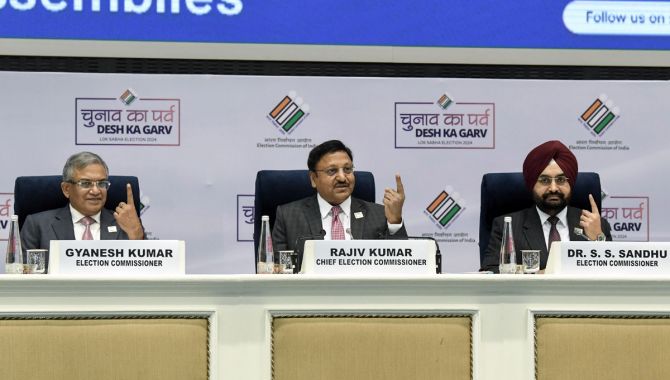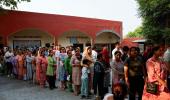'One of the principles of the MCC that you should not make hate speeches and create hatred between communities on the basis of religion was violated on a scale that was never seen before.'
'Religious symbols were very liberally used and speeches were made to polarise people on the basis of religion.'

Constitutional expert and former secretary general of the Lok Sabha P D T Achary tells Prasanna D Zore/Rediff.com how the Election Commission of India didn't act against those who blatantly violated its model code of conduct related to conducting free and fair elections.
How free and fair have been the Lok Sabha election 2024 as the role of the Election Commission is concerned and the environment in which this election was contested?
It should be very difficult for me to say how far this election was free and fair because I was not involved in the process. I would not know how things were working out on the ground. But the point is, from the paper reports and all that, the violation of the model code of conduct (MCC) has happened too often and the violators were senior political leaders.
Now the question is why the MCC which enables us to have a free and fair election, provide a level playing field, was allowed to be violated.
Can one say that this Lok Sabha election were conducted by the Election Commission in a free and fair manner?
You can't have a free and fair election if you don't ensure that the MCC was upheld in the letter and spirit. But that (the MCC) has been violated too often by senior political leaders and senior leaders of the government.
This is something which perhaps has not happened in the past at such a scale. So there the Election Commission was found wanting.
To say the least, the Election Commission can do certain things. For example, Article 324 gives powers to the Election Commission. The only condition is that if there is a statute which governs a particular thing (violation of the MCC), then the Election Commission has to go by that statute.
But if there is no statute dealing with any particular situation, then the Election Commission can drop out from Article 324 and take appropriate action (under the provisions of The Representation of People's Act, 1951) so that the whole election remains free and fair.
The ultimate aim is to have a free and fair election.
That is why Article 324 gives power to the Election Commission. Article 324 does not empower the Election Commission to not take action when there is a violation of the directions issued by the Election Commission.
Therefore, it is a mandate of the Constitution to the Election Commission to act and not sit back and watch things.
What are the powers vested in the Election Commission by Article 324?
These are actually not specified. The point is that it depends on the situations and issues. But that flexibility is there. The Constitution does not specify what exactly these powers are.
The Supreme Court has said that Article 324 contains the reservoir of powers which the Election Commission can use for dealing with a particular situation.
One of the principles of the MCC that you should not make hate speeches and create hatred between communities on the basis of religion was violated on a scale that was never seen before.
Religious symbols were very liberally used and speeches were made to polarise people on the basis of religion. This actually goes against the law.
Apart from the MCC, this (hate speeches) goes against the law because in the Representation of People's Act, there are two provisions: One is article Section 123 of the Representation of People Act, 1951, which says that you cannot use any religion or religious symbol to influence the voters. That would be a corrupt practice under the law.
The consequence of that is that the Election Commission can invalidate (the election of an MP, but that can happen only) on a petition (filed in a court) after the election is over.
The other one is Section 125, which says that creating some sort of cleavage or creating tension between religious community based on religion, caste and community is an electoral offense.
In such a case an FIR has to be filed, investigation has to be done and the (petition) has to be filed in a court. The Election Commission's role is to ask the police to register the FIR.
Can this FIR be filed in retrospect? As of now, there have been no FIRs filed against whoever have breached the MCC.

Yes, FIRs can be filed (in retrospect) in a criminal offence. And naturally it can be filed if they were not able to do it during the election time.
The criminality of an act does not end with the election. Criminality is something which lasts longer.
The Election Commission is empowered to do that and that is why the provision has been made in the law.
The MCC very specifically says that no party, no candidate or no person, campaigner included, shall violate any of the provisions listed under Sections 123 and 125. Now the question is what powers can the EC exercise to deal with the situation.
The Election Commission has been taking people off the campaign for 24 hours and 48 hours. If the Election Commission can take a person off the campaign for 24 hours or 48 hours, it can take the person off the campaign for the duration of the election.
No such action has been taken yet against anybody who violated the MCC.
All the people who violate the MCC, particularly people who use religion and religious symbols in the election campaign to influence the people, are in blatant violation of the MCC.
The Election Commission could have taken those people off the campaign for the duration of the election because it was a very serious kind of violation. That could have been done but we (the Election Commission) didn't do it obviously.
Then there is one more thing with regard to the para 16(A) which was added to The Election Symbols (Reservation and Allotment) Order, 1968, (pdf file, external link) which gives powers to the Election Commission to suspend or withdraw recognition of state and/or national political parties.
That was done in exercise of the power vested in the Election Commission by Article 324. This para states that if there is a violation of the model code of conduct, then the Election Commission can suspend or withdraw recognition of the violator temporarily or for a longer time.
The withdrawal or suspension of recognition of a political party takes away from them their right to use the symbols allotted to them by the Election Commission. That means that party will not be able to fight on that symbol for the duration of time that the Election Commission decides as per the provisions of law.
Now the point is when does the Election Commission think that they can use this power? It is actually for the Election Commission to decide if this power will be used when there is a violation of the MCC.
But para 16(A) of the The Election Symbols (Reservation and Allotment) Order, 1968, specifically says that when there is a serious violation of the MCC the Election Commission can withdraw or suspend recognition of the violating party.
[16A. Power of Commission to suspend or withdraw recognition of a recognised political party for its failure to observe Model Code of Conduct or follow lawful directions and instructions of the Commission
Notwithstanding anything in this Order, if the Commission is satisfied on information in its possession that a political party, recognised either as a National party or as a State party under the provisions of this Order, has failed or has refused or is refusing or has shown or is showing defiance by its conduct or otherwise (a) to observe the provisions of the 'Model Code of Conduct for Guidance of Political Parties and Candidates' as issued by the Commission in January, 1991 or as amended by it from time to time, or (b) to follow or carry out the lawful directions and instructions of the Commission given from time to time with a view to furthering the conduct of free, fair and peaceful elections or safeguarding the interests of the general public and the electorate in particular, the Commission may, after taking into account all the available facts and circumstances of the case and after giving the party reasonable opportunity of showing cause in relation to the action proposed to be taken against it, either suspend, subject to such terms as the Commission may deem appropriate, or withdraw the recognition of such party as the National Party or, as the case may be, the State Party.]
How do you define serious violation of the model code of conduct?
Serious violation means blatant use of religion. It's a serious violation of the MCC. Nothing can be more serious than that use of religion in a very blatant way in the election campaign.
So the Election Commission should act. They have been given the power by the Constitution and these powers have been given to be used.
- Part 2 of the Interview: 'No Point In Giving Election Commission Such Power'










